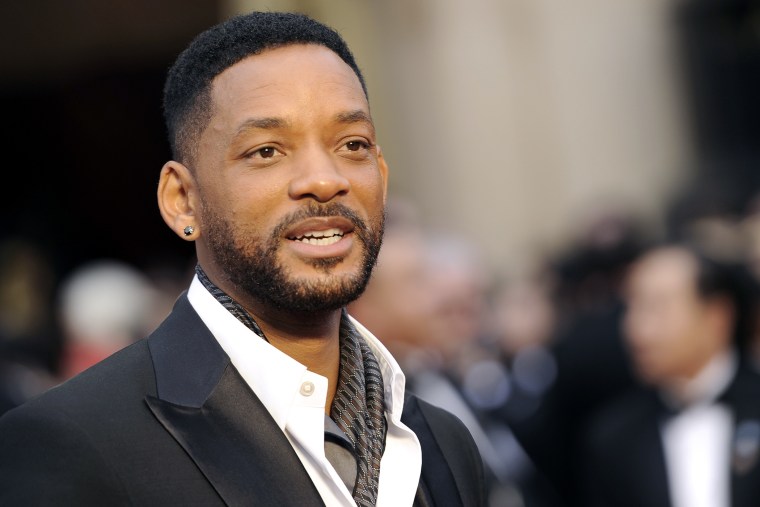Actor Will Smith is throwing his weight behind his wife's call for a black boycott of the Academy Awards, telling ABC's Robin Roberts in an exclusive "Good Morning America" interview that he would sit out the show even "had I been nominated and no other people of color were."
Ever since the Academy Award nominations were announced on Jan. 14, a growing chorus of critics and Hollywood insiders have been calling for protest and change after minority actors went unrecognized for the second year in a row. Among the most vocal was actress Jada Pinkett Smith, who took to social media to say enough is enough.
In a Facebook video, she confirmed that she would be boycotting the Academy Awards and called on members of the black community to marshal their resources to "make programs for ourselves." Since then, directors Spike Lee and Michael Moore have both said they will not attend or watch the show, while others have called on Oscar host Chris Rock to bow out.
Pinkett Smith's call to action drew criticism in some quarters. Her husband's estranged "Fresh Prince of Bel-Air" TV aunt Janet Hubert (who has publicly feuded with Will Smith in the past) claimed his wife was only boycotting the awards because her husband's well-received performance in the NFL medical drama "Concussion" was overlooked. "You ain't Barack and Michelle Obama, and y'all need to get over yourselves," Hubert said in self-released video. "You are a part of Hollywood. You are part of the system that is unfair to other actors, so get real." And Fox News personality Stacey Dash has called the boycott "ludicrous."
"We have to make up our minds. Either we want to have segregation or integration. If we don’t want segregation then we need to get rid of channels like BET and the BET Awards and the [NAACP] Image Awards, where you are only awarded if you are black,” Dash said on "Fox and Friends" on Wednesday. BET has since responded to Dash, suggesting she should return the payment she received for appearing on the network's scripted TV show "The Game."
RELATED: George Clooney reacts to #OscarsSoWhite: 'We're moving in the wrong direction'
"This is so deeply not about me. This is about the children that are going to sit down and watch this show and they aren't going to see themselves represented," Smith said on GMA. "The nominations reflect the Academy. The Academy reflects the industry, reflects Hollywood. And the industry reflects America. It reflects a series of challenges that we are having in our country at the moment. There is a regressive slide towards separatism, towards racial and religious disharmony. That's not the Hollywood that I want to leave behind."
The Academy Awards have recognized Smith's work in the past. He was nominated for Best Actor in 2002 for his performance in the biopic "Ali" and again in 2007 for "The Pursuit of Happyness." Both years, ironically, he lost to another African-American actor. "I've never lost to a white person," Smith said with a laugh, while acknowledging that all of this year's nominees are "fantastic" and deserving of their accolades.
"Diversity is the American superpower," Smith said. "I think that I have to protect and fight for the ideals that make our country, and make our Hollywood community, great. So when I look at the series of nominations for the Academy, it's not reflecting that beauty."
"If we are not part of the solution, we are part of the problem," he added.
Smith's fiery reaction is a far cry from his tempered remarks on race during a recent Hollywood Reporter panel discussion. “Everybody is prejudiced,” he said last fall. “Everybody has their life experiences that make them prefer one thing over another.”
When asked about his experiences in the film industry, Smith acknowledged that he has turned down roles that occasionally felt insensitive on race matters, but he added: “I live with constant prejudice, but racism is actually rare.”
Meanwhile, the debate over whether an Oscars boycott will be an effective strategy has continued. The Los Angeles branch of MSNBC host Rev. Al Sharpton's National Action Network has called for a nationwide "TV Tune Out" of the show by black viewers. On the other hand, Gil Robertson, the head of the African American Film Critics Association, has argued that while a boycott "would not get anyone anyplace," it's important to keep the conversation going around issues of diversity and representation.
"At the end of the day, there were a lot of people who were not invited to the party,” he told the Atlanta-Journal Constitution. “And let’s not forget, there were no Asians in the top line categories and only one Hispanic.”
